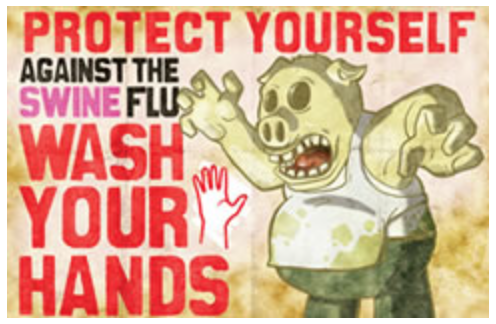Safer soap
25th Jul 2009

"Mum, can you develop a swine flu sanitiser that I could use on the bus?" asked my youngest daughter as she arrived home from school last week. "Everyone has them" she added.
"Swine flu sanitiser," I mused. It seems that media hype surrounding the current swine flu epidemic has turned us into a nation of compulsive hand-washers.
It is true that washing our hands is a proven way to kill germs, and is recommended by the NHS as one of the key ways of reducing the spread of swine flu. But has hand washing become a double-edged sword?A multi-million pound marketing opportunity
It has certainly created a multi-million pound opportunity for those in the business of selling anti-bacterial soaps and sanitisers; often the preferred choice of anxious consumers. But ironically, due to their chemical content, these can be the very cause of another threat to health; toxic chemicals.
Surely, an equally important reason for regular hand-washing is to help reduce our exposure to toxic chemicals, especially where children are concerned. This has been highlighted by recent reports that children ingest significant amounts of toxic chemicals from their hands.
Hormone-disrupting chemicals such as phthalates are picked up from plastics and vinyls. Toxic flame-retardants from household textiles. And toxic residues remaining on the hands from anti-bacterial hand wash and sanitizers - used supposedly to protect our health.
No better than soap and water
It is a fact that anti-bacterial soaps do kill bacteria and microbes. But a number of studies (*see below) have found that they provide no benefits over plain soap and water.
The main reason to avoid anti-bacterial soaps is the active ingredient, triclosan - a toxic chemical found in most liquid hand soaps.
According the Environmental Working Group, triclosan is linked to liver and inhalation toxicity, and even low levels of triclosan may disrupt thyroid function. As a result, it is listed in the Environmental Working Group's 'Top 7 chemicals to avoid'. Furthermore, it has been suggested that triclosan may encourage bacterial resistance to antibiotics.
Triclosan also affects the natural environment. Waste-water filtration does not completely remove the chemical, meaning that it ends up in our rivers and water sources and becomes very toxic to aquatic life.
So what about sanitisers? The problem with sanitisers is that they're designed to kill bacteria - not to remove the dirt which toxic chemicals cling to. Washing with soap and water not only kills bacteria, but also removes toxin-laden grime.
Another thing to consider is that all of ingredients in hand sanitisers are left to fully absorb into the skin.
Botanicals safe soap
Knowing what ingredients to avoid is important, but identifying safe alternatives is equally vital.
Botanicals naturally anti-bacterial liquid hand soap is 100% pure, 100% natural, 100% chemical safe and 100% earth-friendly. Certified organic by the Soil Association, it is made with organic sunflower and coconut oils, with a high percentage of pure essential oils - including naturally anti-bacterial tea tree.
It is available in two fragrances; lavender & geranium and mandarin & lemongrass - and is attractively packaged in a re-usable, recyclable bottle.
Half-price offer
As part of our Safer Soap Campaign, we are offering the hand soap for just £4.95 - half the normal retail price. Even better value is the one litre refill - also at half the normal price - at just £12.50. (Offer ends January 31st.)
Click here to view our natural and organic hand washes.
We're always interested in getting feedback from visitors to our website. Click here to let us know your views about our 'Safer soap' campaign.
Wendy
*Reporting the findings of some 27 studies, The US National Library of Medicine says: 'Soaps containing triclosan... were no more effective than plain soap at preventing infectious illness symptoms and reducing bacterial levels on the hands'. It adds: 'Several laboratory studies demonstrated evidence of triclosan-adapted cross-reference to antibiotics among different spieces of bacteria. Click here to read the page. And click here to read the Envirnomental Working Group's report that triclosan is no better than plain soap.
